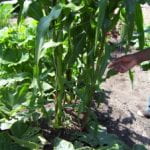The Three Sisters: Exploring an Iroquois Garden (pdf).
New York State Learning Standards for The Three Sisters (pdf).
 The Three Sisters | A Legend | Diversity | How to Plant the Three Sisters | Activities | Information | Evaluation
The Three Sisters | A Legend | Diversity | How to Plant the Three Sisters | Activities | Information | Evaluation

Human culture and horticulture, they are so closely tied!
Horticulture is the art and science of growing fruits, flowers, and vegetables. It is a practice in which people from all cultures of the world have been absorbed for thousands of years. What better way to learn about a society than to explore the way that people grow and use food!
In this project, you will do just that. By looking at an Iroquois gardening method, you will gain a better view of Native American culture. Exploring the foods, the customs, and the stories that evolved from the planting of corn, beans, and squash—the Three Sisters—will help you understand the values that surround these crops.
Planting these three native crops will help you become familiar with a crop management system practiced by the Iroquois people. By experimenting with an Iroquois garden, you will learn some basic plant breeding concepts and see how crops respond to being planted together. You will also learn about the need for plant diversity and the importance of saving different plant species. Perhaps most importantly, you will learn about several different types of corn and why this plant has been so honored by the Iroquois.
The Iroquois people are actually a confederacy of six nations: the Mohawk, Oneida, Onondaga, Cayuga, Seneca, and Tuscarora. Native Americans call themselves the Haudenosaunee, meaning “people of the longhouse.” The word Iroquois, which was used by the French to describe them, has become most familiar today and will be used in this publication.
Farming and plant breeding were not necessarily “men’s work.” In fact, among many Native Americans, such as the Seneca, the plant breeders and farmers have traditionally been women.


